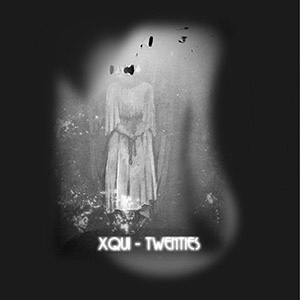
❉ A carefully constructed, intelligent and mature work from a musician very much in control of his art…

“This is no longer the 1920s of flappers, posh girls and jazz; this is the 1920s of Fritz Lang’s Metropolis, and of a decade existing in the shadow of the world’s first mechanised war…. This is a set of tracks about a certain point in time; a key, slightly schizophrenic decade when everything was changing and where all the previous societal norms were transgressed, obliterated and left behind.”
“Anyway, here it is then…the Twenties’
Let’s start with the obvious.
More albums should begin with Joyce Grenfell. Her crisp, posh English tones (taken from the Pathe news short seen below) reminiscing about her school days in the 1920s with her chums Pam, Enid and Daphne open the new album from Xqui in a pleasingly unexpected way. It’s a solid point to push off from, with Grenfell’s jolly-hockey-sticks intonation providing an anchor of familiarity for the listener, catching onto the folk memory we all have of that particular sort of well-meaning, painfully polite, upper class Englishwoman of the now distant past.
And then, when those same prim tones begin to distort and break apart, when the words echo back on themselves and create broken mirrors and overlapping cadences, then you know you’re about to go somewhere unexpected. It feels, in fact, like a moment from the spookier end of 1970s British television, like a lost scene from Sapphire & Steel or a particularly disturbing moment from Children of the Stones. Time, it feels, is breaking apart.
Xqui’s last album Ambients was heavily steeped in the more traditional komische and ambient sounds, with echoes of William Basinski and, most strongly, Aguirre-era Popol Vuh. From the start, though, it’s clear that that Twenties is an altogether different beast.
Miss Grenfell’s Twenties gives way to first DDos and then Brigade, a pair of tracks peppered with what could be distorted and treated speech, but could equally well be wordless drones and snippets of found sound. There’s a sense of attack in the first track, and movement in the second, all of which shifts the album onwards onto Delta, in which a twenties crooner’s muted voice is overwhelmed by unearthly ambient sounds. It’s a lovely piece, reminiscent of Campbell Kneale’s work as Birchville Cat Motel (especially, his deconstruction of the ballroom scene from the movie The Shining in the track Driving Bruce Russell’s Volvo). The physical distance of the singer’s voice and the overlaying of unrelated sounds is unsettling, conjuring up mental images of ghostly hauntings – a sense which the artist builds on in the wordless, angelic choir which flutters around 1928, which immediately follows.

Ambulate is another track in which an original 20s musical piece – this time a jazzy instrumental – is subsumed and obliterated by the pressure of wordless voices, then an occasional hammering, mechanistic beat. The sense of menace, of something unearthly breaking though, continues to builds, as the jazz struggles to the surface again and again, only to disappear once more. It’s a genuinely unsettling experience. This is full blown hautology. Played with headphones on, in the dark, and it’s enough to have you reaching for the light switch.
Thankfully, Xqui provides a respite of sorts with Inteference, in which a more modern voice repeats one or two brief phrases over and around a fast tempo beat until bird song morphs into slower waves of ambient sound. The track serves as a palate cleanser, in fact, a liminal point between two conflicting, but over-lapping, spaces…
And that’s entirely appropriate, because the remaining tracks have a very different feel to them, while still retaining the same over-arching theme.
This is no longer the 1920s of flappers, posh girls and jazz; this is the 1920s of Fritz Lang’s Metropolis, and of a decade existing in the shadow of the world’s first mechanised war. Existential dread and cracks in time give way to brutality and the sound of thundering industry. Loading and then Silence are grimly mechanical pieces, with industrial sounds framing what could be an intermittent heartbeat, or possibly the sound of a machine in operation. Naruq injects an eastern voice to proceedings, and both Martha and Sleep conjure up images of more machines, in action and coming to rest, respectively. Aurora, which concludes the album, caps matters with a man’s voice, speaking an unknown and incomprehensible (to me, anyway) language, coming up against the sound of synthesised strings, and culminating in a long, deathly drone.
If I’ve made this sound a slightly schizophrenic album, then that’s because it is, I think. But the theme, the core, is the same throughout. This is a set of tracks about a certain point in time; a key, slightly schizophrenic decade when everything was changing and where all the previous societal norms were transgressed, obliterated and left behind. The stresses which that caused in society are mirrored in each of the two sets of tracks – the pressure builds on the first half of the album, peaks, and then does the same again in the second. Only the emphasis is different.
Twenties is a carefully constructed, intelligent and mature work from a musician very much in control of his art, and that’s reflected in the journey he takes the listener on. By the time the album ends, it’ll seem you’ve travelled a long way from Joyce Grenfell and the importance of playing cricket with a straight bat, and yet at the same time, the distance wasn’t all that far at all…
❉ XQUI – ‘Twenties’ releases March 12, 2021 and is available for pre-order on Bandcamp. Subexotic Records: Follow on Bandcamp | Follow on Twitter | Follow on Instagram | Follow on Facebook
❉ Stuart Douglas is an author, and editor and owner of the publisher Obverse Books. He has written four Sherlock Holmes novels and can be found on twitter at @stuartamdouglas
